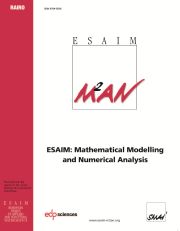Crossref Citations
This article has been cited by the following publications. This list is generated based on data provided by Crossref.
Brandts, Jan
Hannukainen, Antti
Korotov, Sergey
and
Křîžek, Michal
2011.
On angle conditions in the finite element nethod.
SeMA Journal,
Vol. 56,
Issue. 1,
p.
81.
Hannukainen, Antti
Korotov, Sergey
and
Křížek, Michal
2012.
The maximum angle condition is not necessary for convergence of the finite element method.
Numerische Mathematik,
Vol. 120,
Issue. 1,
p.
79.
Li, Qin
Lin, Qun
and
Xie, Hehu
2013.
Nonconforming finite element approximations of the Steklov eigenvalue problem and its lower bound approximations.
Applications of Mathematics,
Vol. 58,
Issue. 2,
p.
129.
Hu, Jun
Huang, Yunqing
and
Lin, Qun
2014.
Lower Bounds for Eigenvalues of Elliptic Operators: By Nonconforming Finite Element Methods.
Journal of Scientific Computing,
Vol. 61,
Issue. 1,
p.
196.
Křížek, Michal
and
Somer, Lawrence
2023.
Mathematical Aspects of Paradoxes in Cosmology.
p.
205.

